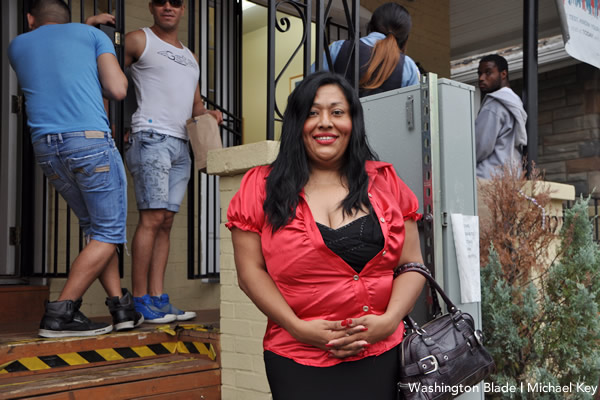Local
D.C. youth report being forced into prostitution
Civil rights panel holds hearing on LGBT sex trafficking

Dany, who asked the Washington Blade not to use his last name, came to Virginia from Mexico in 2009 to escape the discrimination and abuse he said he suffered from his classmates and family members because he is gay. Those whom he said kidnapped him after he ran away from the school to which his parents had sent him as a child threatened to kill him because of his sexual orientation.
Dany moved to D.C. last year, but the woman with whom he was living soon told him the money he gave her to live in her home was not enough to pay for food and rent. He said that his landlord forced him to prostitute himself. He made the revelation during a District of Columbia State Advisory Committee to the U.S. Commission on Civil Rights hearing on trafficking of LGBT youth in Northwest Washington on Tuesday. Dany told the Blade in a follow-up interview she threatened to report him as an undocumented immigrant if he refused.
“I had no guidance because I was very fearful,” he told the commissioners. “I had no direction on what to do.”
A report the State Department issued in June said up to 27 million people around the world are currently victims of labor and sex trafficking. Up to an estimated 300,000 people in the United States are currently involved with human trafficking.
The Polaris Project, an organization that combats human trafficking, estimates 100,000 children are currently in the sex trade in the U.S. The group’s National Human Trafficking Hotline has also received more than 80,000 calls from people who want to report cases as well as victims seeking support.
Those who testified at the hearing said homophobia and transphobia only exacerbate the problem of human trafficking among LGBT youth.
Andrea Powell, executive director of FAIR Girls, an organization that advocates on behalf of exploited girls and young women in the D.C. metropolitan area and elsewhere, highlighted the case of a 17-year-old transgender teenager from Maryland she said had recently been arrested for solicitation.
Powell said the teen has run away 62 times because of the abuse she said she suffered in the foster care system in which she has lived since birth. She said the teen’s boyfriend who is in his early 40s sometimes allows her to live with him in “exchange for sex.” Powell said he has also asked his girlfriend to have sex with others to help him pay the rent.
“The situation was pretty normal to her,” Powell said. “She would prefer not to have sex for money. She really preferred not to have sex with her boyfriend, but she did not want to be sent back to foster care and saw this as the best case scenario.”
A report the Williams Institute published last year indicates 40 percent of homeless youth are LGBT. Nearly 70 percent of service providers who responded to the survey cited family rejection as a major contributing factor to homelessness among this population.
Statistics from the National Coalition for the Homeless in 2009 indicate LGBT youth are more susceptible to victimization and mental health problems once they become homeless. The group said nearly 60 percent of homeless LGBT youth have been sexually assaulted, compared to roughly a third of their heterosexual counterparts. The National Coalition for the Homeless also found homeless LGBT youth are 7.4 times more likely to become a victim of sexual violence than those who are straight.
One person who requested anonymity told the committee a man who lived with his family in Honduras when he was a child began to abuse him because he is gay. He said his family kicked him out of the house after he told local authorities the man impregnated his 13-year-old sister.
The witness told the committee he began selling drugs to make money, but subsequently turned to prostitution. He said the person with whom he currently lives threatens to tell his family about what he is doing.
“This person is kind of a bad person to me,” he told the committee. “He has made me do stuff that I don’t want to do.”
The Polaris Project, the Metropolitan Police Department and the U.S. Conference of Catholic Bishops are among the members of the D.C. Human Trafficking Task Force that formed in 2004 to increase the amount of trafficker prosecutions while identifying and expanding services to victims. It also receives grants from the U.S. Department of Justice and the Bureau of Justice Assistance to combat the issue.
Casa Ruby CEO Ruby Corado, who told commissioners during the hearing she had to work four jobs to pay the family with whom she lived after she moved to the U.S. from her native El Salvador in 1986, said homophobic and transphobic attitudes among some older D.C. police officers remain a barrier to LGBT trafficking victims. She said the situation has begun to improve through the Metropolitan Police Department’s Gay and Lesbian Liaison Unit.
“There are open-minded law enforcement out there,” D.C. Police Det. Steven Schwalm told commissioners during his testimony. “If you’re being exploited, by all means give us a call. We’re here to help.”
Powell said another potential solution is to work with law enforcement officials to refer trafficking victims to services under so-called safe harbor laws as opposed to placing them under arrest for solicitation and other crimes.
“Incarceration and detention are not safety planning options,” she said. “They’re not our best case scenarios.”
As for Dany, he began volunteering at Casa Ruby after he said four men beat him up because he is gay last December as he left his apartment to see his psychologist. He has a new place to live and has applied for a U visa that allows crime victims to live in the U.S.
Dany, now 23, told the Blade he no longer prostitutes himself.
“If my story is going to help someone, I’m going to tell it,” he said.
The National Human Trafficking Resource Center’s hotline is (888) 373-7888 or 233733 via text message.
Virginia
Gay Va. State Sen. Ebbin resigns for role in Spanberger administration
Veteran lawmaker will step down in February

Alexandria Democrat Adam Ebbin, who has served as an openly gay member of the Virginia Legislature since 2004, announced on Jan. 7 that he is resigning from his seat in the State Senate to take a job in the administration of Gov.-Elect Abigail Spanberger.
Since 2012, Ebbin has been a member of the Virginia Senate for the 39th District representing parts of Alexandria, Arlington, and Fairfax counties. He served in the Virginia House of Delegates representing Alexandria from 2004 to 2012, becoming the state’s first out gay lawmaker.
His announcement says he submitted his resignation from his Senate position effective Feb. 18 to join the Spanberger administration as a senior adviser at the Virginia Cannabis Control Authority.
“I’m grateful to have the benefit of Senator Ebbin’s policy expertise continuing to serve the people of Virginia, and I look forward to working with him to prioritize public safety and public health,” Spanberger said in Ebbin’s announcement statement.
She was referring to the lead role Ebbin has played in the Virginia Legislature’s approval in 2020 of legislation decriminalizing marijuana and the subsequent approval in 2021of a bill legalizing recreational use and possession of marijuana for adults 21 years of age and older. But the Virginia Legislature has yet to pass legislation facilitating the retail sale of marijuana for recreational use and limits sales to purchases at licensed medical marijuana dispensaries.
“I share Governor-elect Spanberger’s goal that adults 21 and over who choose to use cannabis, and those who use it for medical treatment, have access to a well-tested, accurately labeled product, free from contamination,” Ebbin said in his statement. “2026 is the year we will move cannabis sales off the street corner and behind the age-verified counter,” he said.
Maryland
Steny Hoyer, the longest-serving House Democrat, to retire from Congress
Md. congressman served for years in party leadership

By ASSOCIATED PRESS and LISA MASCARO | Rep. Steny Hoyer of Maryland, the longest-serving Democrat in Congress and once a rival to become House speaker, will announce Thursday he is set to retire at the end of his term.
Hoyer, who served for years in party leadership and helped steer Democrats through some of their most significant legislative victories, is set to deliver a House floor speech about his decision, according to a person familiar with the situation and granted anonymity to discuss it.
“Tune in,” Hoyer said on social media. He confirmed his retirement plans in an interview with the Washington Post.
The rest of this article can be found on the Baltimore Banner’s website.
District of Columbia
Kennedy Center renaming triggers backlash
Artists who cancel shows threatened; calls for funding boycott grow

Efforts to rename the Kennedy Center to add President Trump’s name to the D.C. arts institution continue to spark backlash.
A new petition from Qommittee , a national network of drag artists and allies led by survivors of hate crimes, calls on Kennedy Center donors to suspend funding to the center until “artistic independence is restored, and to redirect support to banned or censored artists.”
“While Trump won’t back down, the donors who contribute nearly $100 million annually to the Kennedy Center can afford to take a stand,” the petition reads. “Money talks. When donors fund censorship, they don’t just harm one institution – they tell marginalized communities their stories don’t deserve to be told.”
The petition can be found here.
Meanwhile, a decision by several prominent musicians and jazz performers to cancel their shows at the recently renamed Trump-Kennedy Center in D.C. planned for Christmas Eve and New Year’s Eve has drawn the ire of the Center’s president, Richard Grenell.
Grenell, a gay supporter of President Donald Trump who served as U.S. ambassador to Germany during Trump’s first term as president, was named Kennedy Center president last year by its board of directors that had been appointed by Trump.
Last month the board voted to change the official name of the center from the John F. Kennedy Memorial Center For The Performing Arts to the Donald J. Trump And The John F. Kennedy Memorial Center For The Performing Arts. The revised name has been installed on the outside wall of the center’s building but is not official because any name change would require congressional action.
According to a report by the New York Times, Grenell informed jazz musician Chuck Redd, who cancelled a 2025 Christmas Eve concert that he has hosted at the Kennedy Center for nearly 20 years in response to the name change, that Grenell planned to arrange for the center to file a lawsuit against him for the cancellation.
“Your decision to withdraw at the last moment — explicitly in response to the Center’s recent renaming, which honors President Trump’s extraordinary efforts to save this national treasure — is classic intolerance and very costly to a non-profit arts institution,” the Times quoted Grenell as saying in a letter to Redd.
“This is your official notice that we will seek $1 million in damages from you for this political stunt,” the Times quoted Grenell’s letter as saying.
A spokesperson for the Trump-Kennedy Center did not immediately respond to an inquiry from the Washington Blade asking if the center still planned to file that lawsuit and whether it planned to file suits against some of the other musicians who recently cancelled their performances following the name change.
In a follow-up story published on Dec. 29, the New York Times reported that a prominent jazz ensemble and a New York dance company had canceled performances scheduled to take place on New Year’s Eve at the Kennedy Center.
The Times reported the jazz ensemble called The Cookers did not give a reason for the cancellation in a statement it released, but its drummer, Billy Hart, told the Times the center’s name change “evidently” played a role in the decision to cancel the performance.
Grenell released a statement on Dec. 29 calling these and other performers who cancelled their shows “far left political activists” who he said had been booked by the Kennedy Center’s previous leadership.
“Boycotting the arts to show you support the arts is a form of derangement syndrome,” the Times quoted him as saying in his statement.
-

 National5 days ago
National5 days agoWhat to watch for in 2026: midterms, Supreme Court, and more
-

 Opinions5 days ago
Opinions5 days agoA reminder that Jan. 6 was ‘textbook terrorism’
-

 Colombia5 days ago
Colombia5 days agoClaudia López criticizes Trump over threats against Colombian president
-

 District of Columbia4 days ago
District of Columbia4 days agoImperial Court of Washington drag group has ‘dissolved’




















